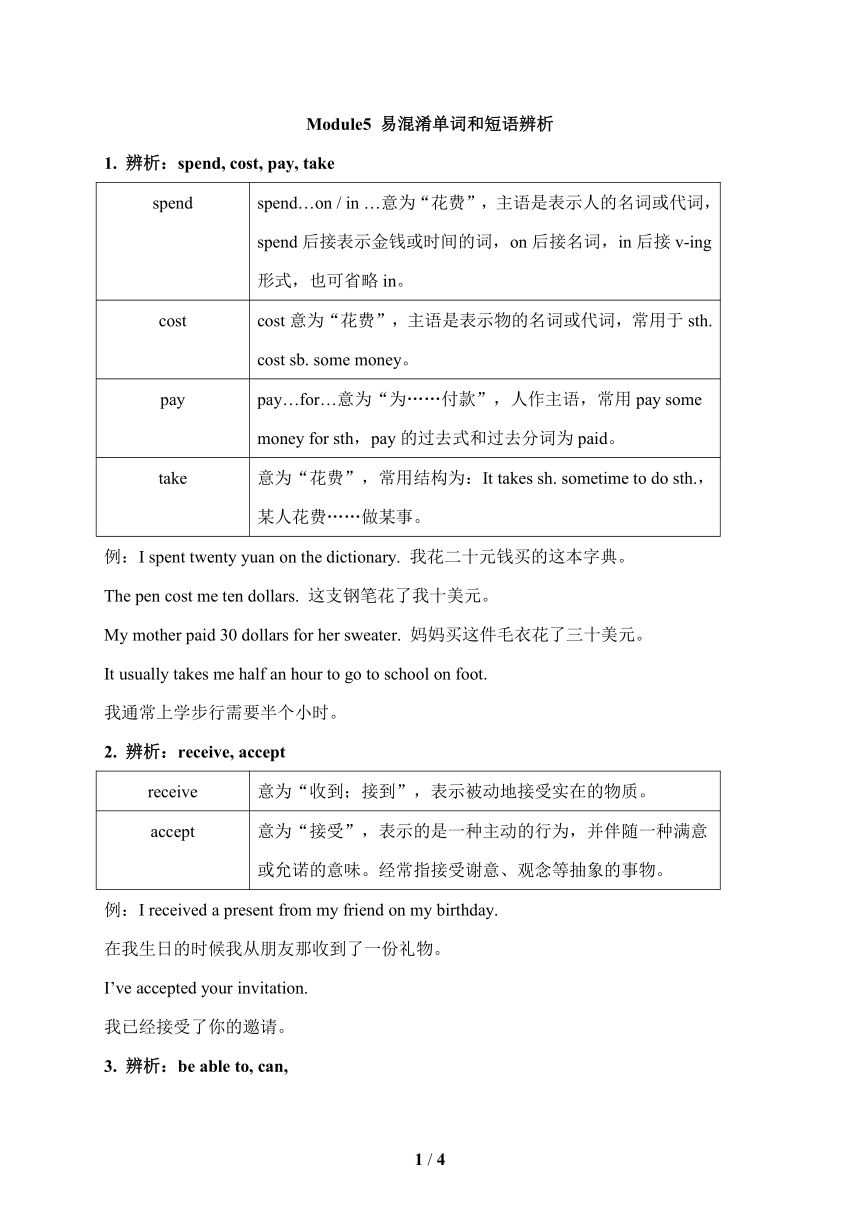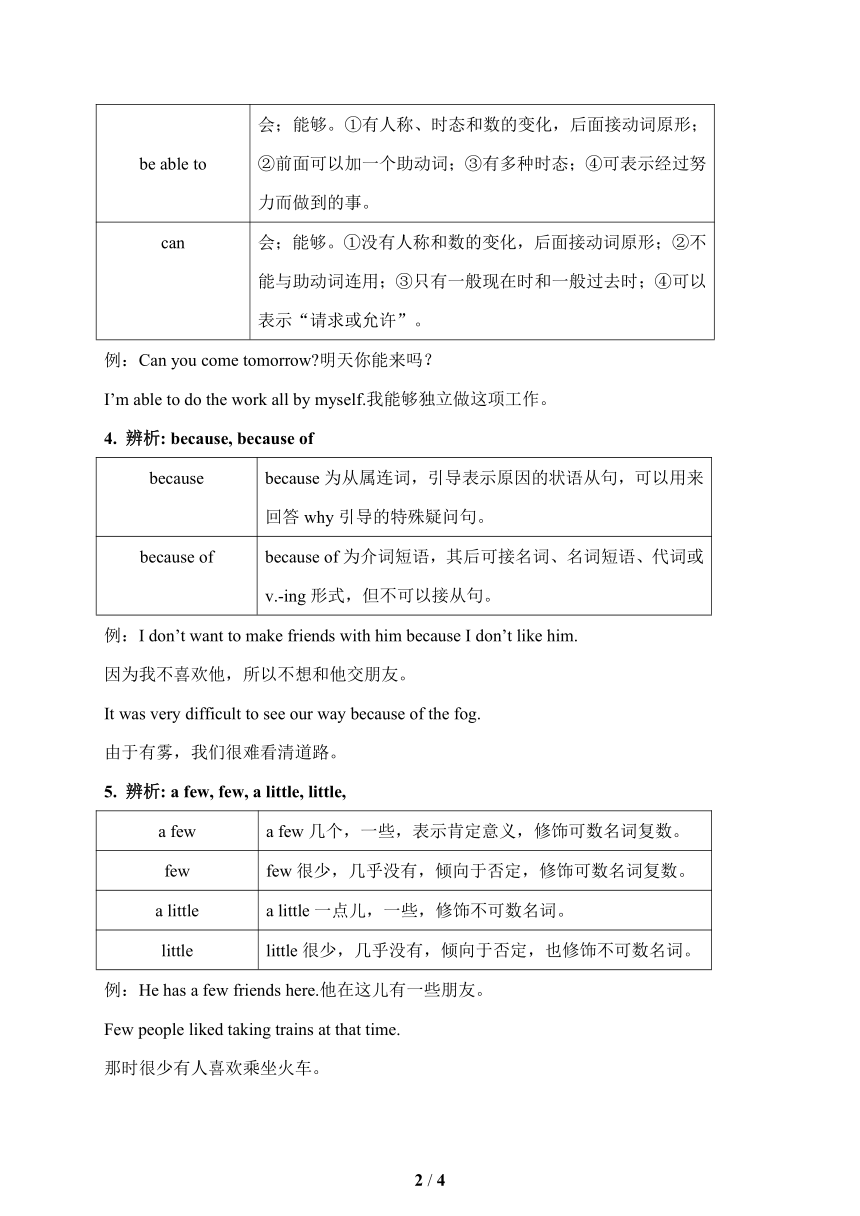Module5 Shopping易混淆单词和短语辨析(WORD版)
文档属性
| 名称 | Module5 Shopping易混淆单词和短语辨析(WORD版) |  | |
| 格式 | doc | ||
| 文件大小 | 48.5KB | ||
| 资源类型 | 教案 | ||
| 版本资源 | 外研版 | ||
| 科目 | 英语 | ||
| 更新时间 | 2022-06-11 23:02:35 | ||
图片预览


文档简介
Module5 易混淆单词和短语辨析
1. 辨析:spend, cost, pay, take
spend spend…on / in …意为“花费”,主语是表示人的名词或代词,spend后接表示金钱或时间的词,on后接名词,in后接v-ing形式,也可省略in。
cost cost意为“花费”,主语是表示物的名词或代词,常用于sth. cost sb. some money。
pay pay…for…意为“为……付款”,人作主语,常用pay some money for sth,pay的过去式和过去分词为paid。
take 意为“花费”,常用结构为:It takes sh. sometime to do sth.,某人花费……做某事。
例:I spent twenty yuan on the dictionary. 我花二十元钱买的这本字典。
The pen cost me ten dollars. 这支钢笔花了我十美元。
My mother paid 30 dollars for her sweater. 妈妈买这件毛衣花了三十美元。
It usually takes me half an hour to go to school on foot.
我通常上学步行需要半个小时。
2. 辨析:receive, accept
receive 意为“收到;接到”,表示被动地接受实在的物质。
accept 意为“接受”,表示的是一种主动的行为,并伴随一种满意或允诺的意味。经常指接受谢意、观念等抽象的事物。
例:I received a present from my friend on my birthday.
在我生日的时候我从朋友那收到了一份礼物。
I’ve accepted your invitation.
我已经接受了你的邀请。
3. 辨析:be able to, can,
be able to 会;能够。①有人称、时态和数的变化,后面接动词原形;②前面可以加一个助动词;③有多种时态;④可表示经过努力而做到的事。
can 会;能够。①没有人称和数的变化,后面接动词原形;②不能与助动词连用;③只有一般现在时和一般过去时;④可以表示“请求或允许”。
例:Can you come tomorrow 明天你能来吗?
I’m able to do the work all by myself.我能够独立做这项工作。
4. 辨析: because, because of
because because为从属连词,引导表示原因的状语从句,可以用来回答why引导的特殊疑问句。
because of because of为介词短语,其后可接名词、名词短语、代词或v.-ing形式,但不可以接从句。
例:I don’t want to make friends with him because I don’t like him.
因为我不喜欢他,所以不想和他交朋友。
It was very difficult to see our way because of the fog.
由于有雾,我们很难看清道路。
5. 辨析: a few, few, a little, little,
a few a few几个,一些,表示肯定意义,修饰可数名词复数。
few few很少,几乎没有,倾向于否定,修饰可数名词复数。
a little a little一点儿,一些,修饰不可数名词。
little little很少,几乎没有,倾向于否定,也修饰不可数名词。
例:He has a few friends here.他在这儿有一些朋友。
Few people liked taking trains at that time.
那时很少有人喜欢乘坐火车。
There is a little milk left in the bottle.
瓶子里还剩一点儿牛奶。
There is little food in the fridge.
冰箱里几乎没有什么食物了。
6. 辨析:something,, nothing, anything
something 意为“某事物”,一般用在肯定句中或表示委婉语气的一般疑问句中。
nothing 意为“没有东西;没有什么”,本身具有否定含义。
anything 用于肯定句,意为“任何事物、任何事情”,作all或everything解;用于疑问句或条件句中,意为“什么事情、什么事物”;用于否定句,意为“任何事物、任何事情”。
例:I don’t know anything about it. 对于这件事我什么都不知道。
I have something important to tell you.我有一些重要的事情要告诉你。
There is nothing interesting in the book.这本书里没什么有趣的内容。
7. 辨析:somewhere, anywhere, nowhere
somewhere 意为“一些地方”,常用于肯定句中。
anywhere 意为“任何地方”,可用于肯定句、否定句或一般疑问句中。
nowhere 意为“没有地方”,本身具有否定含义。
例:I want to go somewhere warm.我想去一个温暖的地方。
Did you find anywhere relaxing 你找到令人放松的地方了吗?
During the winter holiday I went nowhere, just stayed at home.
整个寒假,我哪都没有去,就待在家里。
8. 辨析:one day, some day, the other day
one day 意为“某一天”,指将来或过去的某一天。
some day 意为“某一天”,只用于将来时。
the other day 意为“不久前,几天前”,只用于过去时。
如:One day, the monkey saw a villager.一天,那只猴子看见了一个村民。
China dream will come true one some day.总有一天中国梦会实现。
I asked the car the other day.几天前我叫过车。
1. 辨析:spend, cost, pay, take
spend spend…on / in …意为“花费”,主语是表示人的名词或代词,spend后接表示金钱或时间的词,on后接名词,in后接v-ing形式,也可省略in。
cost cost意为“花费”,主语是表示物的名词或代词,常用于sth. cost sb. some money。
pay pay…for…意为“为……付款”,人作主语,常用pay some money for sth,pay的过去式和过去分词为paid。
take 意为“花费”,常用结构为:It takes sh. sometime to do sth.,某人花费……做某事。
例:I spent twenty yuan on the dictionary. 我花二十元钱买的这本字典。
The pen cost me ten dollars. 这支钢笔花了我十美元。
My mother paid 30 dollars for her sweater. 妈妈买这件毛衣花了三十美元。
It usually takes me half an hour to go to school on foot.
我通常上学步行需要半个小时。
2. 辨析:receive, accept
receive 意为“收到;接到”,表示被动地接受实在的物质。
accept 意为“接受”,表示的是一种主动的行为,并伴随一种满意或允诺的意味。经常指接受谢意、观念等抽象的事物。
例:I received a present from my friend on my birthday.
在我生日的时候我从朋友那收到了一份礼物。
I’ve accepted your invitation.
我已经接受了你的邀请。
3. 辨析:be able to, can,
be able to 会;能够。①有人称、时态和数的变化,后面接动词原形;②前面可以加一个助动词;③有多种时态;④可表示经过努力而做到的事。
can 会;能够。①没有人称和数的变化,后面接动词原形;②不能与助动词连用;③只有一般现在时和一般过去时;④可以表示“请求或允许”。
例:Can you come tomorrow 明天你能来吗?
I’m able to do the work all by myself.我能够独立做这项工作。
4. 辨析: because, because of
because because为从属连词,引导表示原因的状语从句,可以用来回答why引导的特殊疑问句。
because of because of为介词短语,其后可接名词、名词短语、代词或v.-ing形式,但不可以接从句。
例:I don’t want to make friends with him because I don’t like him.
因为我不喜欢他,所以不想和他交朋友。
It was very difficult to see our way because of the fog.
由于有雾,我们很难看清道路。
5. 辨析: a few, few, a little, little,
a few a few几个,一些,表示肯定意义,修饰可数名词复数。
few few很少,几乎没有,倾向于否定,修饰可数名词复数。
a little a little一点儿,一些,修饰不可数名词。
little little很少,几乎没有,倾向于否定,也修饰不可数名词。
例:He has a few friends here.他在这儿有一些朋友。
Few people liked taking trains at that time.
那时很少有人喜欢乘坐火车。
There is a little milk left in the bottle.
瓶子里还剩一点儿牛奶。
There is little food in the fridge.
冰箱里几乎没有什么食物了。
6. 辨析:something,, nothing, anything
something 意为“某事物”,一般用在肯定句中或表示委婉语气的一般疑问句中。
nothing 意为“没有东西;没有什么”,本身具有否定含义。
anything 用于肯定句,意为“任何事物、任何事情”,作all或everything解;用于疑问句或条件句中,意为“什么事情、什么事物”;用于否定句,意为“任何事物、任何事情”。
例:I don’t know anything about it. 对于这件事我什么都不知道。
I have something important to tell you.我有一些重要的事情要告诉你。
There is nothing interesting in the book.这本书里没什么有趣的内容。
7. 辨析:somewhere, anywhere, nowhere
somewhere 意为“一些地方”,常用于肯定句中。
anywhere 意为“任何地方”,可用于肯定句、否定句或一般疑问句中。
nowhere 意为“没有地方”,本身具有否定含义。
例:I want to go somewhere warm.我想去一个温暖的地方。
Did you find anywhere relaxing 你找到令人放松的地方了吗?
During the winter holiday I went nowhere, just stayed at home.
整个寒假,我哪都没有去,就待在家里。
8. 辨析:one day, some day, the other day
one day 意为“某一天”,指将来或过去的某一天。
some day 意为“某一天”,只用于将来时。
the other day 意为“不久前,几天前”,只用于过去时。
如:One day, the monkey saw a villager.一天,那只猴子看见了一个村民。
China dream will come true one some day.总有一天中国梦会实现。
I asked the car the other day.几天前我叫过车。
同课章节目录
- Module 1 Lost and found
- Unit 1 Whose bag is this?
- Unit 2 Are they yours?
- Unit 3 Language in use
- Module 2 What can you do ?
- Unit 1 I can play the piano
- Unit 2 I can run really fast
- Unit 3 Language in use
- Module 3 Making plans
- Unit 1 What are you going to do at the weekends?
- Unit 2 We're going to cheer the players.
- Unit 3 Language in use
- Module 4 Life in the future
- Unit 1 Everyone will study at home
- Unit 2 Every family will have a small plane.
- Unit 3 Language in use
- Module 5 Shopping
- Unit 1 What can I do for you?
- Unit 2 You can buy everything on the Internet
- Unit 3 Language in use
- Module 6 Around town
- Unit 1 Could you tell me how to get to the Nationa
- Unit 2 The London Eye is on your right.
- Unit 3 Language in use
- Revision module A
- Module 7 My past life
- Unit 1 I was born in a small village.
- Unit 2 I was born in Quincy.
- Unit 3 Language in use
- Module 8 Story time
- Unit 1 Once upon a time….
- Unit 2 Goldilocks hurried out of the house.
- Unit 3 Language in use
- Module 9 Life history
- Unit 1 He left school and began work at the age of
- Unit 2 He decided to be an actor.
- Unit 3 Language in use
- Module 10 A holiday journey
- Unit 1 What did you do?
- Unit 2 This morning we took a walk.
- Unit 3 Language in use
- Module 11 Body language
- Unit 1 They touch noses!
- Unit 2 Here are some ways to welcome them.
- Unit 3 Language in use
- Module 12 Western music
- Unit 1 It's so beautiful!
- Unit 2 Vienna is the centre of European classical
- Unit 3 Language in use
- Revision module B
